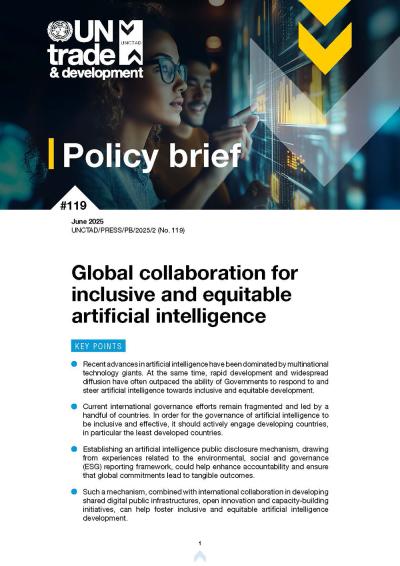Global collaboration for inclusive and equitable artificial intelligence

Artificial intelligence can be deployed virtually anywhere, extending its influence across borders. Yet its development is largely driven by a few technology leaders. Governments therefore need to establish policies ensuring that its development serves the public interest and benefits all.
International artificial intelligence governance initiatives are directed by developed countries, while many developing countries, despite having significant stakes in the future of artificial intelligence, have limited influence over its trajectory. There is a risk that such an imbalance may undermine the legitimacy and effectiveness of global governance and hinder efforts to promote artificial intelligence as a global public good.
An inclusive and multi-stakeholder approach is essential in order to ensure that artificial intelligence is accessible and beneficial for everyone, while fostering innovation to advance sustainable development.
Ensuring benefits for all while fostering innovation requires incorporating accountability mechanisms into global artificial intelligence governance, to align its development with shared goals and values.
In addition, international cooperation is critical, particularly with regard to the three key drivers of artificial intelligence transformation, namely, digital infrastructure, data and skills.
Key points:
- Recent advances in artificial intelligence have been dominated by multinational technology giants. At the same time, rapid development and widespread diffusion have often outpaced the ability of Governments to respond to and steer artificial intelligence towards inclusive and equitable development.
- Current international governance efforts remain fragmented and led by a handful of countries. In order for the governance of artificial intelligence to be inclusive and effective, it should actively engage developing countries, in particular the least developed countries.
- Establishing an artificial intelligence public disclosure mechanism, drawing from experiences related to the environmental, social and governance (ESG) reporting framework, could help enhance accountability and ensure that global commitments lead to tangible outcomes.
- Such a mechanism, combined with international collaboration in developing shared digital public infrastructures, open innovation and capacity-building initiatives, can help foster inclusive and equitable artificial intelligence development.
This policy brief builds on the findings in Chapters I and Chapters V of UNCTAD, 2025, Technology and Innovation Report 2025: Inclusive Artificial Intelligence for Development.


